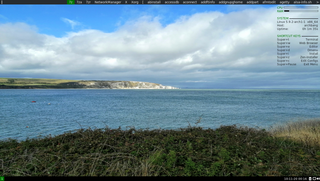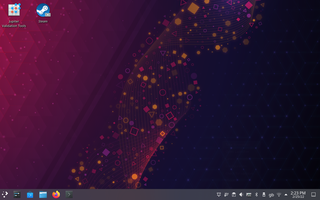
A Linux distribution is an operating system that includes the Linux kernel for its kernel functionality. Although the name does not imply product distribution per se, a distro, if distributed on its own, is often obtained via a website intended specifically for the purpose. Distros have been designed for a wide variety of systems ranging from personal computers to servers and from embedded devices to supercomputers.

Xandros, Inc. was a software company which sold Xandros Desktop, a Linux distribution. The name Xandros was derived from the X Window System and the Greek island of Andros. Xandros was founded in May 2001 by Linux Global Partners. The company was headquartered in New York City with its development office in Ottawa, Canada.

Virtual PC is a discontinued x86 emulator software for Microsoft Windows hosts and PowerPC-based Mac hosts. It was created by Connectix in 1997 and acquired by Microsoft in 2003, after which the program was renamed Microsoft Virtual PC. In July 2006, Microsoft released the Windows version free of charge. The Mac version was discontinued following the transition to Intel processors that same year.

A live CD is a complete bootable computer installation including operating system which runs directly from a CD-ROM or similar storage device into a computer's memory, rather than loading from a hard disk drive. A live CD allows users to run an operating system for any purpose without installing it or making any changes to the computer's configuration. Live CDs can run on a computer without secondary storage, such as a hard disk drive, or with a corrupted hard disk drive or file system, allowing data recovery.
Installation of a computer program, is the act of making the program ready for execution. Installation refers to the particular configuration of software or hardware with a view to making it usable with the computer. A soft or digital copy of the piece of software (program) is needed to install it. There are different processes of installing a piece of software (program). Because the process varies for each program and each computer, programs often come with an installer, a specialised program responsible for doing whatever is needed for the installation. Installation may be part of a larger software deployment process.

Arch Linux is an open source, rolling release Linux distribution. Arch Linux is kept up-to-date by regularly updating the individual pieces of software that it comprises. Arch Linux is intentionally minimal, and is meant to be configured by the user during installation so they may add only what they require.

Unified Extensible Firmware Interface is a specification for the firmware architecture of a computing platform. When a computer is powered on, the UEFI-implementation is typically the first that runs, before starting the operating system. Examples include AMI Aptio, Phoenix SecureCore, TianoCore EDK II, InsydeH2O.

Ubuntu is a Linux distribution derived from Debian and composed mostly of free and open-source software. Ubuntu is officially released in multiple editions: Desktop, Server, and Core for Internet of things devices and robots. The operating system is developed by the British company Canonical and a community of other developers, under a meritocratic governance model. As of October 2024, the latest interim release is 24.10, with most-recent long-term support release is 24.04.
Puppy Linux is a family of light-weight Linux distributions that focus on ease of use and minimal memory footprint. The entire system can be run from random-access memory (RAM) with current versions generally taking up about 600 MB (64-bit), 300 MB (32-bit), allowing the boot medium to be removed after the operating system has started. Applications such as AbiWord, Gnumeric and MPlayer are included, along with a choice of lightweight web browsers and a utility for downloading other packages. The distribution was originally developed by Barry Kauler and other members of the community, until Kauler retired in 2013. The tool Woof can build a Puppy Linux distribution from the binary packages of other Linux distributions.

A live USB is a portable USB-attached external data storage device containing a full operating system that can be booted from. The term is reminiscent of USB flash drives but may encompass an external hard disk drive or solid-state drive, though they may be referred to as "live HDD" and "live SSD" respectively. They are the evolutionary next step after live CDs, but with the added benefit of writable storage, allowing customizations to the booted operating system. Live USBs can be used in embedded systems for system administration, data recovery, or test driving, and can persistently save settings and install software packages on the USB device.

Software remastering is software development that recreates system software and applications while incorporating customizations, with the intent that it is copied and run elsewhere for "off-label" usage. The term comes from remastering in media production, where it is similarly distinguished from mere copying.

Wubi is a free software Ubuntu installer, that was the official Windows-based software, from 2008 until 2013, to install Ubuntu from within Windows, to a single file within an existing Windows partition.

UNetbootin is a cross-platform utility that can create live USB systems and can load a variety of system utilities or install various Linux distributions and other operating systems without a CD.

Porteus is a portable operating system based on Slackware. It does not require installation and can be run from fixed and removable media, such as a USB flash drive or compact disc.

ArchBang Linux is a simple lightweight rolling release Linux distribution based on a minimal Arch Linux operating system with the i3 tiling window manager, previously using the Openbox stacking window manager. ArchBang is especially suitable for high performance on old or low-end hardware with limited resources. ArchBang's aim is to provide a simple out-of-the-box Arch-based Linux distribution with a pre-configured i3 desktop suite, adhering to Arch principles.
LinHES is a Linux distribution designed for use on Home Theater PCs (HTPCs). Before version 6, it was called KnoppMyth. The most recent release (R8), for 64-bit machines only, is based on Arch Linux, though previous versions were based on Knoppix and Debian.

SteamOS is a Arch Linux-based Linux distribution developed by Valve. It incorporates Valve's video game storefront Steam and is the primary operating system for the Steam Deck, Valve's portable gaming device, as well as Valve's earlier Steam Machines.

Universal USB Installer (UUI) is an open-source live Linux USB flash drive creation software. It allows users to create a bootable live USB flash drive using an ISO image from a supported Linux distribution, antivirus utility, system tool, or Microsoft Windows installer. The USB boot software can also be used to make Windows 8, 10, or 11 run entirely from USB.














